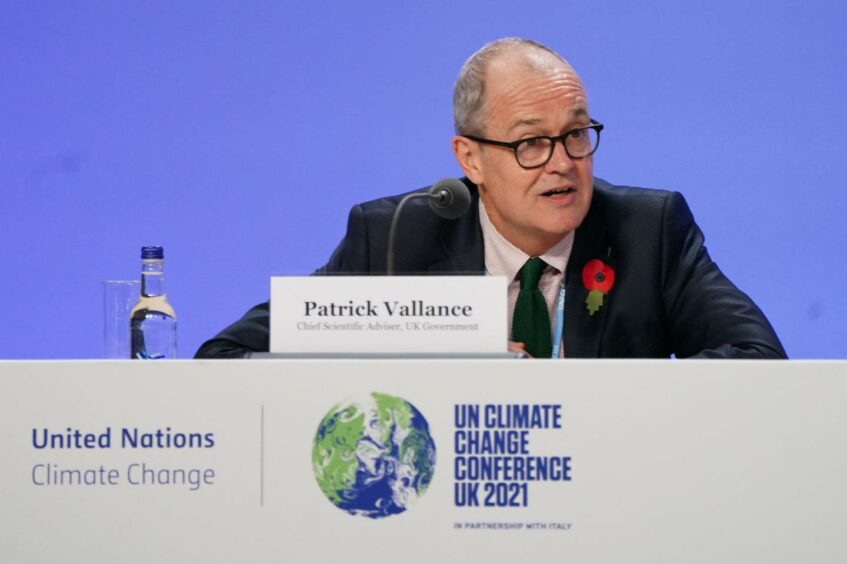
It is crucial that the goal to limit temperature rises to 1.5C is kept alive, Sir Patrick Vallance has warned.
Speaking at COP26, the Government’s chief scientific adviser said the goal, which aims to limit the most dangerous impacts of global warming, is not negotiable, although he acknowledged it will be very tough to meet.
His comments came after he told the BBC that climate change is a bigger problem than Covid-19 because of its overall effect on humanity, warning that “if this is not stopped, this will be a bigger, bigger challenge to the way we live and lives will be lost”.
Before the climate talks in Glasgow, Sir Patrick joined other leading scientific advisers from around the world in calling on leaders to take urgent action to limit warming to 1.5C.
A statement signed by nearly 40 chief scientists and equivalents said it is still possible to curb temperature rises to 1.5C, but only with steep reductions in global emissions by 2030 and reducing them to zero overall by 2050.
In a press conference at COP26, Sir Patrick said: “It’s crucial that the 1.5C is kept alive. I don’t think this is a negotiable thing. It has to happen.”
He pointed to announcements that have been made by countries in the 10 days at the COP26 conference so far, including on curbing methane emissions, on deforestation and funding for agricultural innovation.
“These are all important steps in the right direction. I hope we will see more over the course of this week,” he said.
“This is tough, 1.5C is really tough, it’s not an easy target.”
He said lessons can be learned from the way Covid-19 had to be dealt with, pointing out that science and innovation had to come up with solutions and humanity needed to pull together to take decisions to tackle the crisis.
Sir Patrick, who has previously warned that tackling climate change will require behavioural changes such as eating less meat and flying less, as well as green technology, warned of the need to make behaviour change the easy choice.
“Behaviour change is part of this, and some of that is down to what we do as individuals and some of it is what needs to happen to make things easier for us.
“We can’t assume it’s going to be dramatic personal behaviour change that’s going to be the solution to this unless we make some way to of making that easier so that the green choice is actually the easy choice,” he said.
His comments come as negotiators continue to discuss efforts to increase ambition on climate change to meet the globally agreed goal to try to limit temperature rises to 1.5C, beyond which the worst impacts of rising seas, storms, droughts, crop failures and floods will be felt.
The latest national plans by countries for action on cutting emissions this decade still overall leave the world far off track for the 1.5C goal.
So negotiators are attempting to thrash out a “cover decision” from Glasgow, setting out how countries will close the gap between the plans to cut emissions in this decade and what is needed to avoid temperature rises of more than 1.5C, but how ambitious that will be remains to be decided.
Some 140 countries covering 90% of global emissions have also announced targets to cut emissions to zero overall – known as net zero – by around mid century, but there are questions over the quality of many of the pledges.
Sir Patrick urged nations to swiftly put their climate plans into action, saying: “What we are seeing is pledges and those pledges need to turn into clear plans and those plans need to bring actions.
“The stage is now where we need to turn these plans into detail.”
He said that as well as relying on science to deliver solutions, policy makers must also spell out the necessity of change to their citizens.
“Giving policies a firm and transparent evidence base is an important part of persuading people that this transformational change is necessary, and that the costs of inaction far outweigh the costs of action.”
Recommended for you
